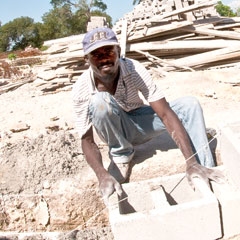
In 1983 Pope John Paul II put a scare into Haiti’s rulers. The pope stepped off his Alitalia plane and, disdaining the red carpet, the banquet and all the pomp Haiti’s royal household could muster, he kissed the ground and spoke directly to the people.
“Fok sa chanj!” he said in Creole from the airport tarmac. “Things here gotta change!” and the pope meant it.
Jean-Claude Duvalier and the ruling class would soon be gone, but things didn’t really change. The misrule of Haiti continued through two successful coups, several parodies of democratic elections, a U.S. invasion and an attempt at civil order by UN peacekeepers. Jean-Bertrand Aristide, the hope of the poor, ended his first presidency ruling by decree. His second presidency was spent blaming others for failures and funneling money to Washington lobbyists.
By the end of 2009, Haitians were still saying things had to change. But even an International Monetary Fund decision to cancel $1.2 billion in Haitian debt seemed unlikely to change anything.
Are the deaths of 230,000 Haitians in a magnitude 7.0 earthquake an opportunity for change? Is Haiti ready for a new beginning with its capital city reduced to rubble?
By March last year international donors had pledged $5.3 billion for reconstruction. Hopeful talk about “refounding” Haiti became common. But at the end of 2010 there were still more than one-million residents of the capital city Port-au-Prince living in tents, cholera was racing through tent camps and the first round of elections had produced rioting.
“We are fighting to build a new Haiti, but it’s a very long process,” Jean-Baptiste Chavannes, leader of the 60,000-strong Mouvman Peyisan Papay (the Peasant Movement of Papay), told The Catholic Register.
More than anything the political culture of Haiti has to change. A winner-take-all version of political leadership, often accompanied by violence — whether it was the paramilitary Tonton Macoutes of the Duvalier regime or the FRAPH attaches of Roul Cedras’ military junta — has poisoned Haiti’s history, said Chavannes.
“The mentality of the Tonton Macoutes is to have money and to have power,” he said.
The mentality of Haiti’s next leaders has to be something different.
“We’re trying to change the old mentality. It’s more profound, deeper,” said Yolette Jeanty, co-ordinator of the women’s rights organization Kay Famn.
“It’s not only building things.”
There was a spark of hope, an indication things could change, in the aftermath of the earthquake, said Jeanty.
“Right after the earthquake, people felt the need to come together,” she said. “There was an opportunity to have Haitians sit together and rethink, but leaders haven’t brought people together.”
A lack of leadership has squandered a precious moment when Haitians stood by one another, dug through the rubble together and shared what they had, said Jeanty. “It was an opportunity,” she said.
While outsiders often see Haiti as a violent and deeply divided society, the solidarity which broke out after the earthquake did not surprise Redemptorist Father Adonai Jean-Juste.
“Charity and love, it is a human value — not only for the rebuilding of Haiti,” he said.
But Jean-Juste also regrets how the sense of common purpose and shared destiny which arose from the earthquake has dissipated.
“We have to work hard to build a new Haiti. It won’t be given to us,” he said. “I believe in a new Haiti — maybe not next year, but we will make it.”
The most essential resource for a new, refounded Haiti is the determined, stubborn hope of ordinary Haitians, said Caritas Haiti spokeswoman Ridana Cornet.
“People from abroad are often surprised by the ability of people in Haiti to keep on,” she said. “Two days after the quake people were out and trying. There’s always the hope that things will get better.”
“The challenge for the many countries and organizations that are willing to help Haiti is to understand that they need to work with the Haitians and not dictate the way things need to change and improve,” said Dr. Peter Kelly, an American who has volunteered for many years in Haiti and helps run the Crudem Foundation’s Sacre Coeur Hospital in Milot.
If Haiti is going to be refounded, the important questions are “How and by whom and for what purpose?” said Haitian expatriate Guerda Nicolas.
Nicolas is outgoing president of the Haitian Studies Association and a professor of psychology at the University of Miami. She has been back in Haiti every month since the earthquake, working on development projects and taking part in official planning.
“I am very hopeful that the Haitian people are very, very strong and very, very resilient,” she said.
There is a role for Haitian ex-patriates, a role for people and nations of good will and a role for the Church in refounding Haiti, said Nicolas. “If you really want to get Haitians moving there are only two things you have to say to them. One is Church, Nicholas said.
“It’s really having an opportunity to connect with their priests and pastors, to hear from their priests and pastors. That has a lot of meaning for them. The second is to talk to them about how to get an education for their kids. Those two things will get Haitians coming out for any meeting.”

